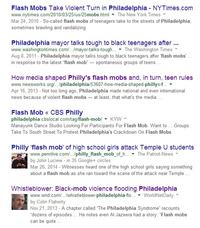Lycos. Altavista. Infoseek. If you are over 30 these names may mean something. They were the competing web search engines of the 90’s that became ancient history as Google grew to become the industry behemoth (with Yahoo Search and Bing in distant second and third). Today, most of us don’t think about which search engine we are using, even as the Internet becomes more and more integrated into our lives. The Free Library recently installed the Google Chrome browser onto its public computers which has Google Search built in. Chrome, and Google products in general, are highly-regarded and useful, but should we be relying on Google exclusively for navigating the web? Are we missing anything by no longer using a variety of search services?
Google uses a complex search procedure, called an algorithm, to provide search results. In general, Google delivers results based on currency, region, your search history, and a popularity ranking called PageRank. The company continually makes tweaks and, much like a fast food chain’s secret sauce, the algorithm’s recipe is not shared ( though experts try to decipher how it changes.) Google’s stated goal in this process is to “look for clues to give you back exactly what you want.”
For most searches this is all well and good. When I search for “rainfall” I get current web pages about rainfall in Philadelphia from reputable sources such as the US National Weather Service. But what about when what is popular and local is not necessarily representative of information on a subject? Can any one algorithm accurately and fairly produce search results relating to a more complex or controversial topic like, say, climate change or Barack Obama?
Many critics say it can’t. Tech writer Carson Ward argues that by relying on web page popularity to deliver search results Google silences minority viewpoints. He explains that Google’s policies result in a closed loop of information that stifles new ideas. This shortcoming can be demonstrated by using a local example of a controversial subject. A search for “Philadelphia flash mobs” brings up mostly news media articles about recent teen violence and the mayor’s response. There are no webpages about non-violent flash mobs in the first few pages of results and only one that looks at the issue from a teen perspective (from Newsworks.org).
Other critics point out that Google by default tailors search results based on previous searches (even if you are not logged into a Google account). This is another attempt by Google to guess what a user wants. For example, if you search for “Iran” or “gay marriage” your results will be different if you have previously searched for “Obama.” If you are using a public PC at a library, your Google search results may be affected by the last person who used that computer.
This is all to say that search engines are complex and always changing. But despite advancements, we cannot expect them to serve up exactly what we need without some effort on our part. To get the most of search engines, here a few guidelines.
Try out different search phrases to get more varied results. GoogleGuide.com provides some good tips on this. A search for “philadelphia flash mobs teen perspective” produces additional articles from the Huffington Post and WHYY on the topic.
When using Google, disable Personalized Search. Click the gray globe symbol (see pic) in the upper right hand of the search results page. In many cases, this will give you different results.
Don’t rely on only one search engine. The giants are Google, Bing, and Yahoo. Others worth trying are Blekko, Ixquick, and DuckDuckGo, the latter two which do not track searches, ensuring more privacy.
Use the Free Library’s electronic databases to complement your research on the Web. For information on current social issues, Expanded Academic ASAP, Infotrac, MasterFILE Main Edition, and Opposing Viewpoints in Context are all useful resources. Also, talk to librarians for more recommendations.
Have a question for Free Library staff? Please submit it to our Ask a Librarian page and receive a response within two business days.



